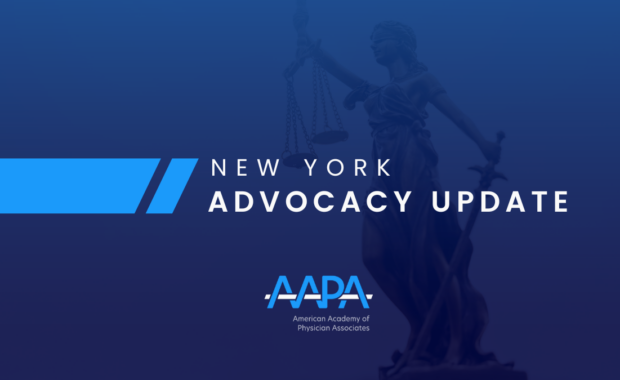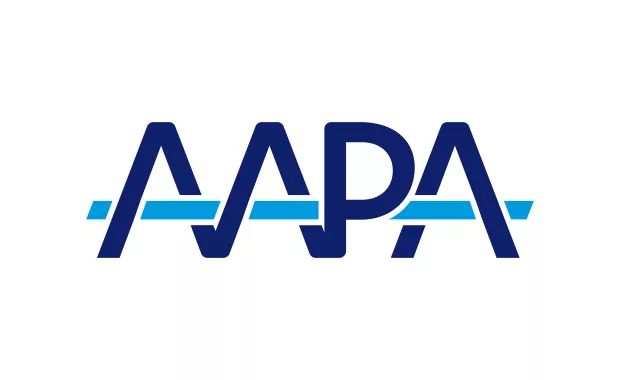Inspired: Daughters and Brother Follow in PA Footsteps
Mother-Daughter, Father-Daughter, Brother-Sister Share Special Connection
May 12, 2023
By Jennifer Walker
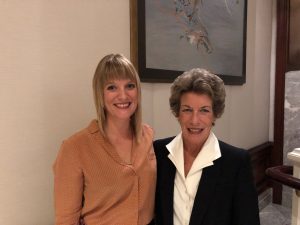
Abby Staible, PA-C, has always wanted to be a PA like her mom, Nancy Staible. As a child, she gained firsthand access to the profession when she spent a couple of afternoons a week at the family practice office where her mom worked. She also remembers taking trips to the grocery store, where her mom would run into and interact with her patients. “I saw the impact that my mom was able to have on people not only in the healthcare setting, but in a very relational, meaningful way,” she says. “That’s what drew me into the profession.”
PA Nancy Staible, who joined the profession in the 1970s, helped shape the way PAs like her daughter practice today. Nancy Staible, a pre-med undergraduate major who had worked in education and as a children’s probation officer before becoming a PA, applied to The Medical College of Georgia in Augusta (now called Augusta University) — one of about five PA programs then and the only one accepting applications — and enrolled in 1973. At that time, the PA role wasn’t clearly defined and some states didn’t allow PAs to practice. So in addition to learning about medicine, Staible and her classmates also learned how to lobby state legislatures and the federal government to advocate for the profession.
After graduating in 1975 — eight years after the first PA class graduated from the Duke University PA Program — Nancy Staible moved to Denver, Colorado, to work in internal medicine with Kaiser Permanente. As one of only four PAs in the region, she worked long hours in the emergency department at St. Joseph’s Hospital. She also co-founded the Colorado Academy of PAs and began to lobby the local government to help PAs gain title protection in the state. By the time she left Kaiser in 1979, PAs were licensed through the Colorado State Medical Board.
That same year, Nancy Staible moved back to Pennsylvania, her home state, and began working in family practice. She also continued to lobby to help PAs get recognition and licensing so they could practice, and Medicare and Medicaid funding so they could get paid. “The biggest success was convincing the legislature that we weren’t just a flash in the pan,” she says. “They had originally thought when we started the profession that the physician shortage — which is what we were there to fill and the reason we were created — would go away and so would we. But we increased the accessibility and availability and quality [of healthcare]. When [the legislature] began to see that along with our cost effectiveness, the lights went on and they really became advocates for us.”
By 2007, the year Abby Staible graduated from the PA program at Emory University in Atlanta, Georgia, the PA profession had grown exponentially with 135 accredited PA programs and 63,609 PAs in the U.S. After graduation, Abby Staible worked in bone marrow transplant for nine years at Huntsman Cancer Institute in Salt Lake City, Utah, and Memorial Sloan Kettering Cancer Center in New York City, and in liver transplant for a year. She is now a clinical science liaison with AstraZeneca, a research-based biopharmaceutical company, in Salt Lake City.
Throughout the years, the Staibles have had a special bond because of their shared interest in medicine. They’ve even gone on three mission trips together. During the first two trips to Honduras and Zambia, Abby Staible was her mom’s assistant, helping her care for patients; by the third trip, also to Zambia, she had graduated from the PA program and was able to see her own patients.
In a recent conference, Abby Staible spoke in a session called “Trailblazing in Industry” about her current work, while Nancy Staible, who continues to volunteer as a PA locally and internationally, sat in the audience. “My mom paved the way for those 230 PAs to be sitting there [who could] potentially be leading hospital organizations,” says Abby Staible. “That was a really special experience.”
Father-and-Daughter PAs Seek Advice From One Another
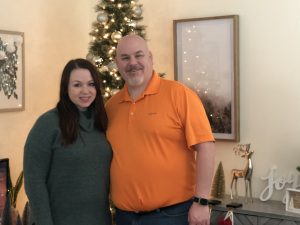
PA Molly Feeney, the third child of four siblings, wasn’t surprised when she learned that one of her preceptors was her dad’s former student. After all, Michael Feeney, PA-C, was one of the first PAs in their town in upstate New York in the 1990s.
Before he became a PA, Michael Feeney went to nursing school then worked in critical care for four years. Two of those years were spent in the emergency department, where he worked with several PAs and began thinking about taking his career in that direction. “I knew I wanted to do something more, and [PAs] got to do what the [physicians] did,” he says.
Following the recommendation of one of his PA colleagues, Feeney enrolled in the PA program at Kings College in Wilkes-Barre, Pennsylvania. Kings College was also the only school close enough for Feeney, who was married with two small children at the time, to commute home on the weekends.
After graduating in 1994, Feeney began working in orthopaedic surgery at United Health Services and Lourdes Hospital, both in upstate New York. “I was the first PA in our area to have inpatient hospital privileges as well as operating room privileges,” he says. Three years later, he became a hospitalist at Lourdes Hospital, then worked in the emergency department at Delaware Valley Hospital in Walton, New York.
Then in 2011, circumstance took Feeney’s career in a different direction. While working at the hospital, he was assaulted by a patient, which left him with a severe concussion. He was out of work for 15 months. When he went back, he transitioned into a career in family practice. He now works as a civilian employee of the United States Air Force at Joint Base McGuire-Dix-Lakehurst in Wrightstown, New Jersey.
Molly Feeney had forgotten that her dad was a PA when she began thinking the career might be a good fit for her. When she made the connection, she was able to shadow one of her dad’s former students. There, she saw the PA and a nurse practitioner consult about a patient, which cemented her interest in the profession. “[The patient’s care] was really a team effort,” she says. “I liked the collaboration.”
After starting college at another university, Molly Feeney transferred to the pre-PA program at Marywood University in Scranton, Pennsylvania, in 2013, then was accepted into the university’s PA program during her junior year. She graduated in 2017 and started working in orthopaedic surgery at Lourdes Hospital in Binghamton, New York, just like her dad did more than two decades earlier. On why she chose her specialty, Molly Feeney says, “The mix of medicine, surgery, and procedures in orthopaedics is amazing. [Also] patients come to us and they’re in pain, and we fix them. That’s the best part of my job.”
As a student, Molly Feeney knew she could call her dad with questions. “But now that I’m working,” she adds, “we can share interesting cases with each other and [I] can see what he would do in similar situations.”
Michael Feeney says he often goes to his daughter for advice. For example, in orthopaedic surgery, treatment protocols have changed since he practiced in the specialty. “She’ll tell me about the different techniques that we weren’t even doing in the specialty places [then],” he says. “It’s really very cool.”
A Sister Inspires Her Brother’s Career Path
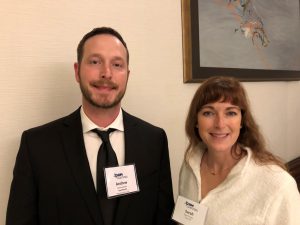
From 2007 to 2008, Andrew Baker, PA-C, then a patient care assistant in Columbus, Ohio, was tossing around three avenues for his career: He could go to medical school, go into medical sales, or become a PA. His sister, Sarah Franks — three years older and his only sibling — had recently graduated from the PA program at Kettering College in Kettering, Ohio, so he was having many phone conversations with her about her work. “I was able to ask my sister lots of personal questions about what she was doing and how much she enjoyed it,” he says. It was these conversations, as well as a positive experience Baker had with a PA after he was in a car accident in 2003, that helped Baker choose his career path.
In 2012, Baker graduated from the PA program at the University of Findlay in Findlay, Ohio — the same school that the PA who cared for him years ago had attended. Since then, he has worked in cancer reconstructive plastic surgery at Ohio State University Wexner Medical Center in Columbus, in internal medicine with a physician in private practice, and in six emergency departments through TeamHealth, a hospital staffing firm. Today, he is the lead advanced practice clinician at Mary Rutan Hospital in Bellefontaine, Ohio.
Asked what his sister said so long ago that made him want to be a PA, Baker says, “I remember her telling me she thought I would be good at it.”
Franks, who chose to become a PA because of the autonomy and opportunity for collaboration that the profession offers, also remembers those conversations with her brother. “He had been a patient himself with serious injuries, which would make him a more compassionate provider,” says Franks, who worked in primary care for seven years before transitioning into her current role at an outpatient psychiatric facility in Dayton, Ohio. “I also knew that Andrew felt at home in the hospital setting.”
Because they are both PAs, Baker and Franks share a special connection. “He’ll share a medical story or send me a quick text with some medical humor,” Franks says. “We’ve [also] consulted each other hundreds of times.”
Baker and Franks have also been to several conferences together, the most recent of which allowed them to spend time with each other, a rarity now that they are both adults with busy lives. “We got to spend three uninterrupted days together and talk about our current careers and what we wanted to do,” Baker says. “It was a great experience.”
Editor’s note: This article originally appeared in January 2019.
Read More:
Street Medicine: PAs Deliver Healthcare to the Homeless
Milestones in PA History
Jennifer Walker is a freelance writer in Baltimore, MD. Contact Jennifer at [email protected].
Thank you for reading AAPA’s News Central
You have 2 articles left this month. Create a free account to read more stories, or become a member for more access to exclusive benefits! Already have an account? Log in.

